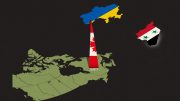In November 2009 Time declared the 2000s “the decade from hell,” in the article “The ’00s: Goodbye (at Last) to the Decade from Hell,” by Andy Serwer.
Although the article focuses on the negative condition America has been in during this 10-year decline, it is needless to say that the entire world has also faced a very troubling decade. From wars, disease, financial ruin and potentially having crossed the environmental “point-of-no-return,” the 2000-10 period has been one “hell of a ride.”
The Time article mentions many major events that occurred throughout the last decade and how they collectively resulted in the worst decade in recent history. Death and destruction have obviously played a major role. From the USS Cole bombing and retaliation in 2000, to the ongoing wars in the east (and all the violence, diseases and natural disasters in between) this truly has been a “decade of death.” Is this a necessary outcome of the world we live in? That’s completely debatable, but what is certain is that these wounds are self-inflicted. Humanity, in pursuing untamed growth and prosperity, has done this to itself. The scarcity of resources ensures that what one gets, another loses.
Beyond technological innovation, the paradigms of the modern world, based on individualism and reckless freedom and growth, have helped shape the way we conduct ourselves in society.
Just as important, the indifference we now feel towards others — those beyond our circle of friends, family, race and religion — is also at fault. It is important to note that regional or national borders do not only define the term “society” — globalization and the cyber-revolution have also made the world at large “our society.”
At the micro-social level, we are kind, compassionate and helpful, but when it comes to those in our periphery, we are less likely to care. Why? It is because life is now based on the individual, not the collective. Moreover, constant streams of propaganda and deliberate framing of issues as X vs.Y forces one to choose a side, when in most cases the truth lies somewhere in between. Once sides are chosen it becomes easier to hate and not care, and harder to empathize.
Besides, who has the time to care anymore? As “slaves” to debt and work, most people have no time to worry about individuals beyond their immediate relations. People are often so consumed by achieving an “ideal” lifestyle (completed with a house, a car, kids and possessions) that it leaves no time to care about anyone else, especially if his or her interests may conflict with your own.
Technology has also played its role in the process. While we cannot blame movies, TV and video games for societal degradation, it seems that constantly seeing chaos in the news and starvation in commercials makes the outcomes of this horrible condition seem like they are part of “just another day.”
This “decade of death” was brought about by a mixture of individualism and indifference — individualism that leads to constant growth, prosperity and dominance, coupled with the indifference people feel beyond their immediate sight (even if that sight includes an entire corporation, nation, race or religion).
“Hope’s Exodus,” one of the songs that I have recorded, says “If this is the best of us/this is hope’s exodus/never coming back to rescue us” — indeed, if we are at the peak of our civilization, then there is no hope.
In a millennium of limitless opportunity, we must change our thinking. In 2010, we as a global society must re-examine the way we interact with those around us. We must re-prioritize what is important in life, as life is not about the individual, but about the collective. What happens to someone else can ultimately affect you. American geopolitics that no one previously seemed to care about led to the events of 9-11, which led to two disastrous wars and to even more chaos. In addition, untamed private economic growth led to the global financial collapse, and non-stop industrial development has led to a beaten-down environment. We can no longer subscribe to a lifestyle of jaded indifference so long as “we” are happy.
Instead, we must be equitable in our interactions and look at the bigger picture — nothing in this world is infinite and it is time to define how much of something is enough. It is time to start caring or otherwise, we will continue going down this treacherous slope.
Omar Zulfi, also known as Lyrical Militant, is a Canadian hip hop artist and producer from Winnipeg, Man..




